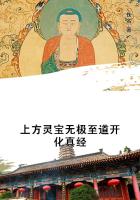The view that the mistletoe was not merely the instrument of Balder's death, but that it contained his life, is countenanced by the analogy of a Scottish superstition. Tradition ran that the fate of the Hays of Errol, an estate in Perthshire, near the Firth of Tay, was bound up with the mistletoe that grew on a certain great oak. A member of the Hay family has recorded the old belief as follows: Among the low country families the badges are now almost generally forgotten; but it appears by an ancient MS., and the tradition of a few old people in Perthshire, that the badge of the Hays was the mistletoe. There was formerly in the neighbourhood of Errol, and not far from the Falcon stone, a vast oak of an unknown age, and upon which grew a profusion of the plant: many charms and legends were considered to be connected with the tree, and the duration of the family of Hay was said to be united with its existence. It was believed that a sprig of the mistletoe cut by a Hay on Allhallowmas eve, with a new dirk, and after surrounding the tree three times sunwise, and pronouncing a certain spell, was a sure charm against all glamour or witchery, and an infallible guard in the day of battle. A spray gathered in the same manner was placed in the cradle of infants, and thought to defend them from being changed for elfbairns by the fairies. Finally, it was affirmed, that when the root of the oak had perished, 'the grass should grow in the hearth of Errol, and a raven should sit in the falcon's nest.' The two most unlucky deeds which could be done by one of the name of Hay was, to kill a white falcon, and to cut down a limb from the oak of Errol. When the old tree was destroyed I could never learn. The estate has been sold out of the family of Hay, and of course it is said that the fatal oak was cut down a short time before. The old superstition is recorded in verses which are traditionally ascribed to Thomas the Rhymer:
While the mistletoe bats on Errol's aik, And that aik stands fast, The Hays shall flourish, and their good grey hawk Shall nocht flinch before the blast.
But when the root of the aik decays, And the mistletoe dwines on its withered breast, The grass shall grow on Errol's hearthstane, And the corbie roup in the falcon's nest.
It is not a new opinion that the Golden Bough was the mistletoe. True, Virgil does not identify but only compares it with mistletoe. But this may be only a poetical device to cast a mystic glamour over the humble plant. Or, more probably, his description was based on a popular superstition that at certain times the mistletoe blazed out into a supernatural golden glory. The poet tells how two doves, guiding Aeneas to the gloomy vale in whose depth grew the Golden Bough, alighted upon a tree, whence shone a flickering gleam of gold. As in the woods in winter cold the mistletoea plant not native to its treeis green with fresh leaves and twines its yellow berries about the boles; such seemed upon the shady holm-oak the leafy gold, so rustled in the gentle breeze the golden leaf. Here Virgil definitely describes the Golden Bough as growing on a holm-oak, and compares it with the mistletoe. The inference is almost inevitable that the Golden Bough was nothing but the mistletoe seen through the haze of poetry or of popular superstition.
Now grounds have been shown for believing that the priest of the Arician grovethe King of the Woodpersonified the tree on which grew the Golden Bough. Hence if that tree was the oak, the King of the Wood must have been a personification of the oakspirit. It is, therefore, easy to understand why, before he could be slain, it was necessary to break the Golden Bough. As an oak-spirit, his life or death was in the mistletoe on the oak, and so long as the mistletoe remained intact, he, like Balder, could not die. To slay him, therefore, it was necessary to break the mistletoe, and probably, as in the case of Balder, to throw it at him. And to complete the parallel, it is only necessary to suppose that the King of the Wood was formerly burned, dead or alive, at the midsummer fire festival which, as we have seen, was annually celebrated in the Arician grove. The perpetual fire which burned in the grove, like the perpetual fire which burned in the temple of Vesta at Rome and under the oak at Romove, was probably fed with the sacred oak-wood; and thus it would be in a great fire of oak that the King of the Wood formerly met his end. At a later time, as I have suggested, his annual tenure of office was lengthened or shortened, as the case might be, by the rule which allowed him to live so long as he could prove his divine right by the strong hand. But he only escaped the fire to fall by the sword.
Thus it seems that at a remote age in the heart of Italy, beside the sweet Lake of Nemi, the same fiery tragedy was annually enacted which Italian merchants and soldiers were afterwards to witness among their rude kindred, the Celts of Gaul, and which, if the Roman eagles had ever swooped on Norway, might have been found repeated with little difference among the barbarous Aryans of the North. The rite was probably an essential feature in the ancient Aryan worship of the oak.
It only remains to ask, Why was the mistletoe called the Golden Bough? The whitish-yellow of the mistletoe berries is hardly enough to account for the name, for Virgil says that the bough was altogether golden, stems as well as leaves. Perhaps the name may be derived from the rich golden yellow which a bough of mistletoe assumes when it has been cut and kept for some months; the bright tint is not confined to the leaves, but spreads to the stalks as well, so that the whole branch appears to be indeed a Golden Bough. Breton peasants hang up great bunches of mistletoe in front of their cottages, and in the month of June these bunches are conspicuous for the bright golden tinge of their foliage. In some parts of Brittany, especially about Morbihan, branches of mistletoe are hung over the doors of stables and byres to protect the horses and cattle, probably against witchcraft.














